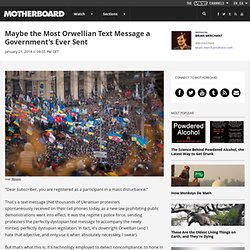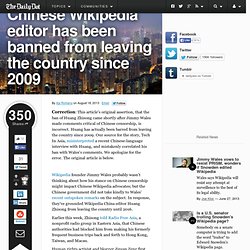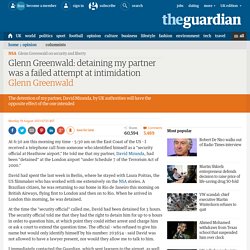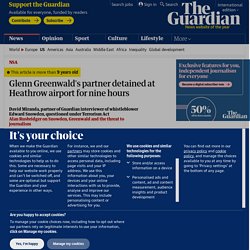

Maybe the Most Orwellian Text Message a Government's Ever Sent. Image: Wikimedia “Dear subscriber, you are registered as a participant in a mass disturbance.”

That's a text message that thousands of Ukrainian protesters spontaneously received on their cell phones today, as a new law prohibiting public demonstrations went into effect. It was the regime's police force, sending protesters the perfectly dystopian text message to accompany the newly minted, perfectly dystopian legislation. In fact, it's downright Orwellian (and I hate that adjective, and only use it when absolutely necessary, I swear). But that's what this is: it's technology employed to detect noncompliance, to hone in on dissent. See, Kiev is tearing itself to shreds right now, but since we're kind of burned out on protests, riots, and revolutions at the moment, it's being treated as below-the-fold news. Hopefully news of the nascent techno-security state will turn some heads—it's right out of 1984, or, more recently, Elysium: technology deployed to "detect" dissent.
Guardian Editor: U.K. 'Security Experts' Entered Offices And Destroyed Hard Drives. China punishes Wikipedia editor for Jimmy Wales' comments. Correction: This article's original assertion, that the ban of Huang Zhisong came shortly after Jimmy Wales made comments critical of Chinese censorship, is incorrect.

Huang has actually been barred from leaving the country since 2009. Our source for the story, Tech In Asia, misinterpreted a recent Chinese-language interview with Huang, and mistakenly correlated his ban with Wales's comments. We apologize for the error. The original article is below. Wikipedia founder Jimmy Wales probably wasn't thinking about how his stance on Chinese censorship might impact Chinese Wikipedia advocates; but the Chinese government did not take kindly to Wales' recent outspoken remarks on the subject.
Earlier this week, Zhisong told Radio Free Asia, a nonprofit radio group in Eastern Asia, that Chinese authorities had blocked him from making his formerly frequent business trips back and forth to Hong Kong, Taiwan, and Macau. But Zhisong has reason to be more pessimistic. "I will not get out," he stated. Detaining my partner: a failed attempt at intimidation. At 6:30 am this morning my time - 5:30 am on the East Coast of the US - I received a telephone call from someone who identified himself as a "security official at Heathrow airport.

" He told me that my partner, David Miranda, had been "detained" at the London airport "under Schedule 7 of the Terrorism Act of 2000. " David had spent the last week in Berlin, where he stayed with Laura Poitras, the US filmmaker who has worked with me extensively on the NSA stories. A Brazilian citizen, he was returning to our home in Rio de Janeiro this morning on British Airways, flying first to London and then on to Rio. When he arrived in London this morning, he was detained. At the time the "security official" called me, David had been detained for 3 hours. I immediately contacted the Guardian, which sent lawyers to the airport, as well various Brazilian officials I know. The stated purpose of this law, as the name suggests, is to question people about terrorism.
Glenn Greenwald's partner detained at Heathrow airport for nine hours. Glenn Greenwald (right) and his partner David Miranda, who was held by UK authorities at Heathrow airport.

Photograph: Janine Gibson The partner of the Guardian journalist who has written a series of stories revealing mass surveillance programmes by the US National Security Agency was held for almost nine hours on Sunday by UK authorities as he passed through London's Heathrow airport on his way home to Rio de Janeiro. David Miranda, who lives with Glenn Greenwald, was returning from a trip to Berlin when he was stopped by officers at 8.05am and informed that he was to be questioned under schedule 7 of the Terrorism Act 2000. The controversial law, which applies only at airports, ports and border areas, allows officers to stop, search, question and detain individuals.
The 28-year-old was held for nine hours, the maximum the law allows before officers must release or formally arrest the individual. There was no comment from the Home Office in relation to the detention.